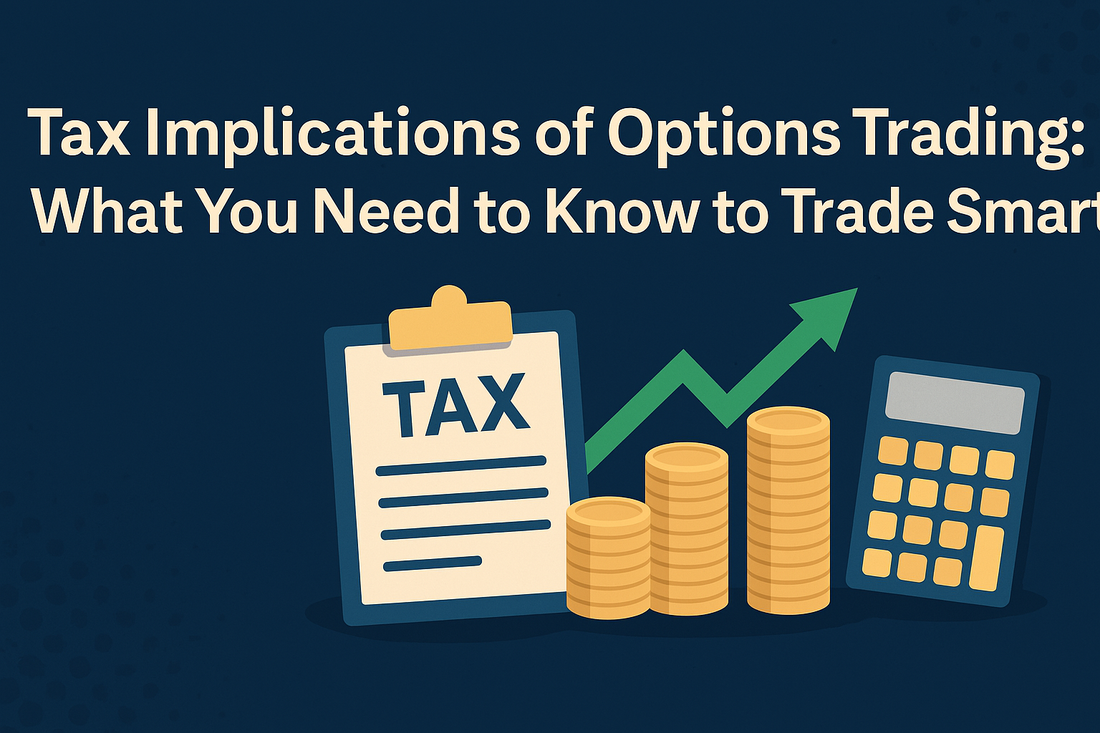
Tax Implications of Options Trading: What You Need to Know to Trade Smart
If you're diving into the world of options trading with dreams of breaking free from the rat race and gaining financial freedom, you're not alone. Many self-sufficient traders start this journey to take control of their financial future. But there’s one aspect of trading that often gets overlooked: tax implications.
In this guide, we'll explore everything you need to know about how taxes affect your options trades. We'll cover the tax basics, reporting requirements, expert tips, best practices for record keeping, and common pitfalls to avoid. Plus, you'll find an easy-to-follow flowchart at the end that outlines the tax process for options trading.
Tax Basics: How Options Trading is Taxed
Before we dive into the nitty-gritty, it’s essential to understand how the tax authorities view options. In most countries, including Singapore and the U.S., options trading is considered investment income, and profits are taxable.
Depending on your jurisdiction, taxes on options may fall into one of the following categories:
1. Capital Gains Tax
Profits from buying and selling options are often considered capital gains. There are two types:
- Short-term capital gains (assets held for less than a year): Usually taxed at your regular income tax rate.
- Long-term capital gains (assets held for more than a year): Often taxed at a lower rate.
Example: If you bought a call option in January and sold it in February, the gain would be taxed as short-term. If you held it until the next year, it might qualify for long-term capital gains.
2. Ordinary Income Tax
In some cases, such as when you write (sell) options or your options expire worthless, the premiums received may be treated as ordinary income.
If you’re a frequent options writer collecting premium income, this might bump up your taxable income significantly. That’s why understanding how different trades are treated is essential.
3. Section 1256 Contracts (U.S. Specific)
Certain options (like index options) may fall under IRS Section 1256. These have a special 60/40 tax rule:
- 60% taxed as long-term capital gains
- 40% taxed as short-term gains
This can be advantageous for active traders because it may reduce your overall tax liability.
Important: Singapore does not impose capital gains tax on individuals. However, if you’re deemed to be trading as a business, your gains might be treated as taxable income. Always check with a qualified tax professional.
Reporting Requirements: What the Tax Authorities Expect
Staying compliant means knowing what to report, when to report it, and how.
1. Maintain Detailed Trade Records
Every single options trade should be documented. Keep track of:
- Trade date
- Type of option (call or put)
- Strike price and expiry date
- Premium paid or received
- Outcome of the trade (exercised, assigned, expired, sold)
- Profit or loss
Having this data at your fingertips not only helps you file taxes but also improves your trading discipline.
2. Annual Reporting
Depending on your country, you’ll have to report your gains or losses annually. In the U.S., this is done on Form 8949 and Schedule D. For Singapore residents, you typically report this in your annual tax filing if your gains are taxable.
Be mindful of deadlines—late or inaccurate filings can attract penalties.
3. Foreign Account Reporting (if applicable)
If you trade with a foreign broker, you may have to declare offshore accounts or earnings, such as:
- FATCA (U.S.)
- CRS (Singapore and other jurisdictions)
Failing to report foreign holdings can lead to serious legal issues, so it’s best to stay transparent.
Expert Tips for Smart Tax Management
You want to keep as much of your profits as possible—and that means minimizing your tax liability legally. Here are expert strategies to help you stay ahead.
1. Separate Trading from Investing
If you trade frequently, consider separating your accounts:
- Trading account: For short-term, active trades
- Investing account: For long-term, passive investments
This distinction can help with clearer reporting and potentially better tax treatment.
2. Use Tax-Loss Harvesting
Offset your gains with your losses. If you had some losing trades, you might be able to reduce your taxable gains by deducting those losses.
Example: If you made $10,000 on a call spread but lost $4,000 on a put debit spread, your taxable gain might be only $6,000.
3. Consider Incorporating
If you’re a high-frequency trader, consult a tax advisor about forming a trading entity. This could offer benefits like:
- Business expense deductions
- Better tax treatment
- Professional appearance to brokers and investors
This is especially useful for full-time traders or those managing larger accounts.
4. Hire a Tax Professional Familiar with Options
Don’t gamble with your taxes. A seasoned tax professional who understands derivatives and trading can save you thousands—and prevent costly mistakes.
They can also help you take advantage of little-known deductions and strategies.
5. Use Tax Software or Trading Journals
Invest in a solid trading journal or software that integrates with tax platforms. Tools like:
- TradeLog
- TraderSync
- Excel spreadsheets with macros
These can help automate your reporting and reduce stress come tax season.
Best Practices for Record Keeping
Your future self will thank you for staying organized today. Here’s how to build good habits:
✅ Maintain a Trading Journal
Record:
- Entry and exit points
- Reason for the trade
- Outcome and reflections
This isn’t just for tax—it makes you a better trader.
✅ Backup Everything
Keep digital and physical copies of statements, confirmations, and invoices. Cloud backups are a must.
Use naming conventions to keep files tidy and searchable.
✅ Log Every Fee and Expense
Commissions, platform subscriptions, educational courses—these may be deductible if you trade as a business.
Even your internet bill and workstation setup might qualify if you're classified as a professional trader.
✅ Review Quarterly
Don’t wait till the end of the year. Review your trades and tax exposure every quarter to avoid surprises.
Use your quarterly review to rebalance your strategy and forecast any tax bills.
Common Pitfalls to Avoid
Even experienced traders make tax mistakes. Here are some to watch out for:
❌ Ignoring Wash Sale Rules (U.S.)
If you sell a security at a loss and buy a substantially identical one within 30 days, the IRS may disallow the loss.
❌ Misreporting Expired Options
If an option expires worthless, it still needs to be reported. The premium paid or received counts toward your P&L.
❌ Not Tracking Adjusted Cost Basis
When an option is exercised, the premium changes the cost basis of the stock. Misreporting this leads to tax errors.
❌ Assuming All Gains Are Tax-Free
Especially for Singaporeans, it’s a myth that all capital gains are tax-free. If you're trading as a business, your profits may be taxable.
Flowchart: Tax Process for Options Trading
Here's a simplified flowchart to understand how options trades are taxed:

Why Understanding Taxes is Crucial to Financial Freedom
Becoming a self-sufficient trader means taking control—not just of your strategy but your financial obligations too. Ignoring taxes can erode your profits and land you in trouble. But with the right knowledge and practices, you can trade smarter, stay compliant, and keep more of what you earn.
When you’re chasing financial freedom, every dollar counts. Understanding how your options trades are taxed allows you to optimize your earnings, make better decisions, and avoid penalties. It also helps you develop a professional mindset—one that sees trading not just as a hobby, but as a serious business.
Whether you're executing weekly income strategies or long-term swing trades, tax awareness is your silent partner in wealth building.
Ready to Trade Smarter?
At www.optionstranglers.com.sg, we offer:
- In-depth live 1-1 sessions / group classes
- Trade examples and breakdowns
- Community mentorship and support
👉 Ready to upgrade your strategy and trade like a pro? Visit www.optionstranglers.com.sg and start your journey to financial freedom today.
Your future is an option. Choose wisely.
Disclaimer: Options involve risk and are not suitable for all investors. Always consult with a financial advisor before investing.
